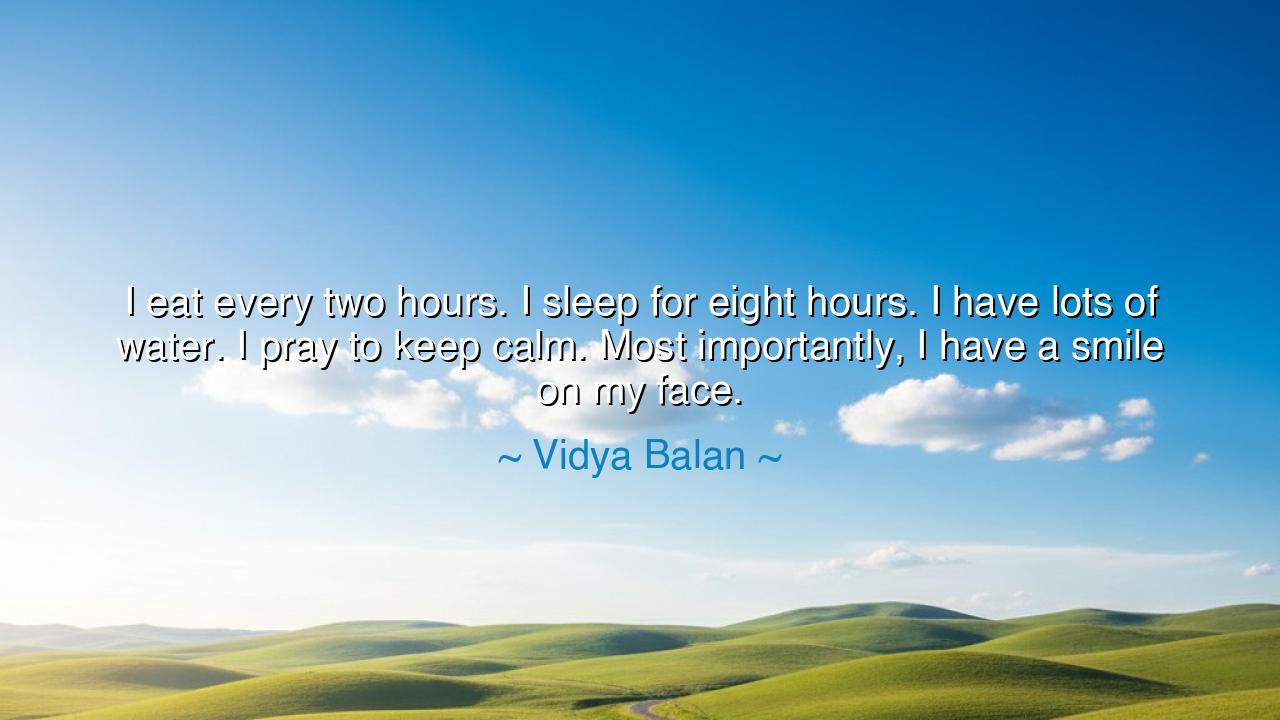
I eat every two hours. I sleep for eight hours. I have lots of
I eat every two hours. I sleep for eight hours. I have lots of water. I pray to keep calm. Most importantly, I have a smile on my face.






The words of Vidya Balan stand as a hymn to balance and resilience: “I eat every two hours. I sleep for eight hours. I have lots of water. I pray to keep calm. Most importantly, I have a smile on my face.” Though they describe the daily habits of the body, their meaning rises far beyond simple routine. They reveal the timeless truth that the human spirit thrives when the body, mind, and soul are cared for together, and that the final crown of all these practices is not wealth or power, but the ability to wear a smile with sincerity.
To eat, to drink, to sleep—these are the foundations of life. Yet so many neglect them in pursuit of fleeting ambitions, forgetting that the temple of the spirit cannot stand if its pillars are broken. Vidya’s words remind us that discipline in these small things sustains not only the body but also the spirit. A nourished body carries energy; a rested mind carries clarity; a hydrated soul carries flow. Such care is not vanity but wisdom, for one cannot hope to face life’s storms with strength if the vessel is weakened.
But beyond the care of the body lies the care of the soul. Vidya speaks of prayer to keep calm, a practice as ancient as humanity itself. Prayer, meditation, reflection—these are the still waters in which the mind is cleansed. In the whirl of life’s battles, to pause and center oneself is to reclaim mastery over chaos. This is why the sages of every tradition taught not only labor but stillness, not only striving but surrender. Prayer is the anchor of calm, and calm is the root of strength.
And yet, Vidya declares that above all stands the smile. This is the crown of her discipline, the outward sign of inward harmony. For what use is food, rest, and prayer if they do not lead to joy? A smile is more than expression—it is the radiant signal that body and soul are aligned, that peace has triumphed over turmoil. The smile does not deny hardship; it transforms it. It tells the world: I have chosen light, even when darkness beckoned.
History gives us noble examples of this truth. Consider Mahatma Gandhi, who despite fasting, imprisonment, and relentless struggle, was often described as carrying a gentle smile. That smile was not weakness, but a weapon of resilience, disarming foes and inspiring millions. In his discipline, as in Vidya’s, the smile was the ultimate proof of inner strength. It was a victory over despair and a gift to all who beheld it.
The lesson for us is clear: greatness is not found only in grand victories but in daily choices—choices to nourish the body, calm the mind, and uplift the spirit. In these habits lies the foundation of resilience. But let us not forget Vidya’s final wisdom: the greatest practice is to keep a smile on your face, for in that smile is the reflection of all your discipline and the light you give to others.
Therefore, let each of us act with intention. Care for your body as the vessel of your soul. Rest when weary, eat with moderation, drink with wisdom, pray with sincerity. But above all, when you rise each day, choose to wear the smile—not as a mask, but as the natural fruit of balance and peace. For that smile will not only strengthen you but will also give hope to others.
Carry forward Vidya Balan’s wisdom: “Most importantly, I have a smile on my face.” Let it remind you that the highest form of discipline is not mere survival, but joyful living—and that the truest strength is not grim endurance, but radiant, unyielding joy.






AAdministratorAdministrator
Welcome, honored guests. Please leave a comment, we will respond soon